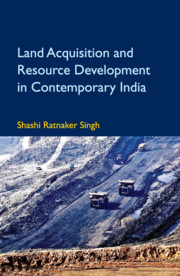Book contents
- Frontmatter
- Contents
- List of Figures
- List of Maps
- List of Tables
- List of Abbreviations
- Foreword
- Acknowledgements
- Part I Theoretical Framework
- 1 Introduction: From Colonial Regime to ‘Welfare State’?
- 2 State, Space and People
- 3 Land, Mines and Minerals
- 4 Land Acquisition and Resource Development in India
- 5 Resource Development and Compensation Issues
- Part II Case Study
- 6 Singrauli: A ‘Space’ of Dependence
- 7 Singrauli: A Development Dilemma
- 8 Administering Singrauli: Governance and Institutions
- 9 Land Acquisition and Its Socio-economic Implications: Field Survey
- Part III Analysis
- 10 Understanding Development
- 11 Conclusion
- Appendix: Memorandum from Mineral-Bearing States
- Bibliography
- Index
10 - Understanding Development
Published online by Cambridge University Press: 16 October 2020
- Frontmatter
- Contents
- List of Figures
- List of Maps
- List of Tables
- List of Abbreviations
- Foreword
- Acknowledgements
- Part I Theoretical Framework
- 1 Introduction: From Colonial Regime to ‘Welfare State’?
- 2 State, Space and People
- 3 Land, Mines and Minerals
- 4 Land Acquisition and Resource Development in India
- 5 Resource Development and Compensation Issues
- Part II Case Study
- 6 Singrauli: A ‘Space’ of Dependence
- 7 Singrauli: A Development Dilemma
- 8 Administering Singrauli: Governance and Institutions
- 9 Land Acquisition and Its Socio-economic Implications: Field Survey
- Part III Analysis
- 10 Understanding Development
- 11 Conclusion
- Appendix: Memorandum from Mineral-Bearing States
- Bibliography
- Index
Summary
Politics of Growth
As discussed earlier, land policy in India has been a critical subject of public debate since Independence but, in the last one decade, the land acquisition issue has become unprecedentedly central to India's political economy. The introduction of the New Economic Policy in 1991 significantly impacted the growth-oriented model of development. It marked a complete transformation in the policy agenda of the government from closed-door economic policies to a market-oriented, investment-friendly environment for private business – an end to the monopoly of public sector enterprises. The economic logic behind such action was the stagnation in industrial and infrastructural growths accruing from sick and untenable public sector companies. The process of structural change had already begun in the early 1980s but it reached its culmination with the adoption of the Structural Adjustment Programme in 1991 in response to the loan received from the International Monetary Fund to overcome the balance of payment crisis. Thereafter, the government continued to remove structural constraints that impeded private investment, such as licensing, heavy taxation, import restrictions and tariffs (Ahluwalia, 1999). In addition, the government laid down a propitious business environment for foreign companies by creating avenues for both foreign direct investment (FDI) and portfolio investment.
The economic logic is, however, not sufficient to explain the policy transition during the early 1990s. If this was so in the 1990s, then it would have been possibly easy to do the same in the 1980s, which did not happen. What has indeed determined the trajectory of economic policies since Independence is the political environment prevailing at different points of time. In this view, it becomes imperative to acknowledge the political contextualization of economic and social policies. The political context may include both internal and external political purviews. Implicit in this political framework are also the ideological and interest imperatives that govern the nature of policies to be formulated and implemented by the government.
The politics of economic growth, in essence, has redefined the nature and strategic choice of the government in economic policy matters since the 1990s. It is less a variant of the laissez-faire state that Friedman (1980) envisages in his theory on the role of government that creates conditions for voluntary exchange by not interfering in a freely functioning market.
- Type
- Chapter
- Information
- Land Acquisition and Resource Development in Contemporary India , pp. 203 - 226Publisher: Cambridge University PressPrint publication year: 2021



